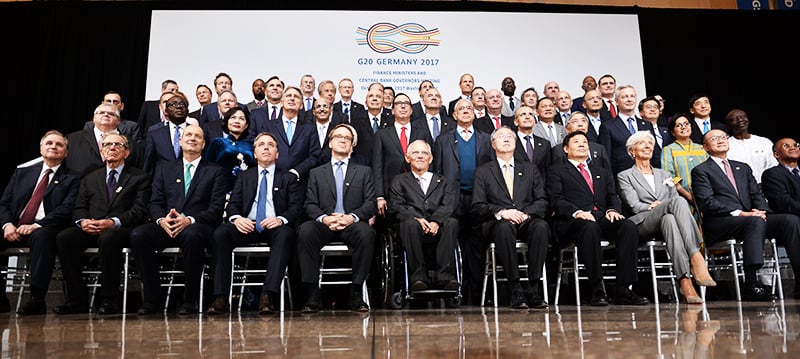World leaders should take advantage of the healthiest global growth in years to pursue policies that will spread prosperity to those being left behind, the head of the International Monetary Fund (IMF) is arguing.
"It is not time to be complacent," IMF Managing Director Christine Lagarde said Thursday. "Policymakers can use this moment to provide more certainty and provide for the future risks."
Lagarde's warning came as global financial leaders gathered in Washington for the annual meetings of the 189-member IMF and its sister lending organisation, the World Bank.
In addition, a meeting of finance officials from the world's 20 biggest economies, the Group of 20, is wrapping up Friday.
Treasury Secretary Steven Mnuchin and Federal Reserve Chair Janet Yellen are representing the United States at these discussions.
IMF forecasters expect the global economy to expand 3.6 per cent this year, the fastest pace since 2010.
And Lagarde says three-fourths of the world economy is participating in the uptick, creating the broadest recovery in a decade.
But many workers have seen their wages stagnate and their jobs replaced or threatened by technology.
And many countries are seeing a widening income gap between rich and poor.
"The result is growing political tensions in many places and increased scepticism about the benefits of globalisation," Lagarde said.
Discontent with globalisation and inequality is stoking the populist politics that took Donald Trump to the White House and prompted British voters to opt out of the European Union.
"We have to reduce the gap between those who have everything and those who have nothing," said French Finance Minister Bruno Le Maire.
While the IMF boosted its outlook for the 19-country Eurozone, Japan and China, it trimmed its estimates slightly for the United States (US) compared with the projections it had made in April.
It now sees US growth at 2.2pc this year and 2.3pc next year, still up from the lacklustre 1.5pc pace of last year.
IMF economists said the reduction of 0.1 percentage point for 2017 and 0.2 percentage point for 2018 reflected less certainty over when the Trump administration will be able to get its tax cut plan through Congress.
Even before the reductions, the IMF's forecast was well below the 3pc growth rates the administration says will be achieved with its policy changes to taxes and regulation and tougher trade enforcement.
A senior US Treasury official, briefing reporters on this week's meetings, said the IMF has other concerns beyond getting involved in the US tax debate.
The official spoke on condition of anonymity to be able to discuss the US agenda in advance of the meetings taking place.
An IMF report out Wednesday concluded that many countries could raise taxes on the wealthiest without sacrificing economic growth.
But Lagarde suggested another way to cut income inequality: putting more women to work, improving their access to credit and narrowing their pay gap with men. "A no-brainer," she said.
Lagarde said one thing the major economies will need to handle carefully is the movement away from massive economic support from their central banks.
Such a move, if not well-telegraphed in advance, could disrupt global financial markets and reduce needed capital to developing countries.
The Federal Reserve has announced that it will start this month trimming its $4.5 trillion balance sheet, which was increased five-fold since 2008 as the Fed tried unconventional means to jump-start economic growth.
The European Central Bank and the Bank of Japan have undertaken similar efforts.
On Thursday, European Central Bank chief Mario Draghi defended the ECB's aggressive easy-money campaign to revive the economy of the 19 countries that share the euro currency.
He said the measures, which include a massive bond-buying program meant to push down interest rates, had helped create 7 million jobs over the last four years.
Speaking at a conference at the Peterson Institute for International Economics, Draghi conceded that unconventional monetary policy can have unintended economic fallout.
But, he said, "the bottom line is, the distortions may be there, but sometimes the trade-off is so powerful that you just ignore them and do the right thing."












































